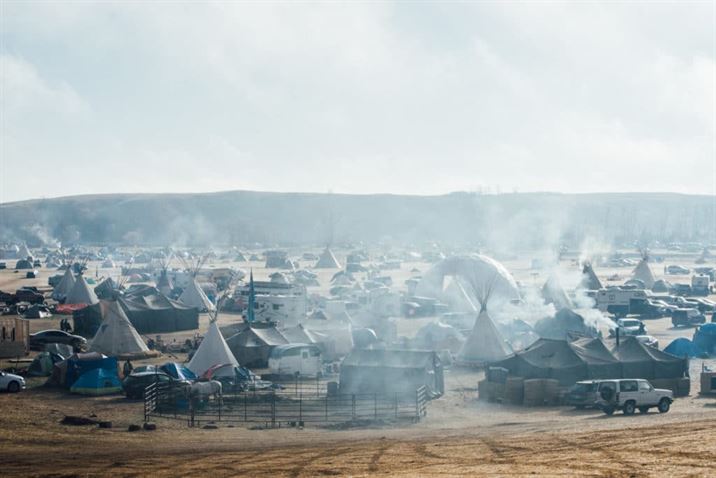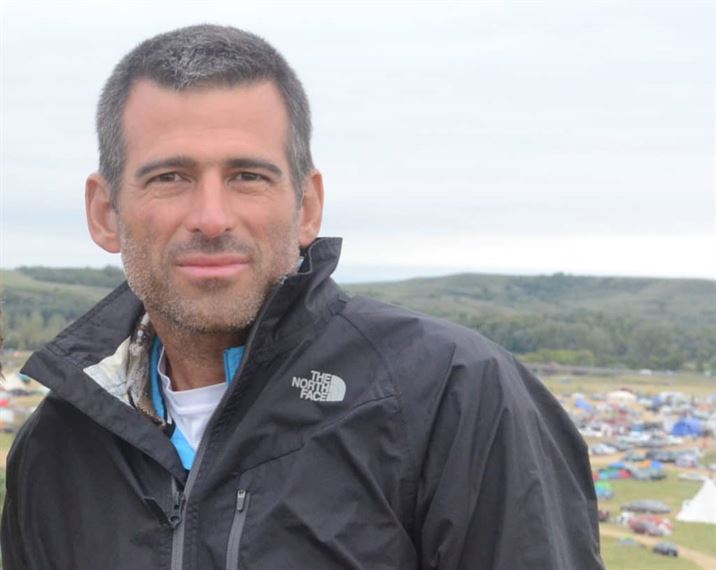Montclair State professor Mark Clatterbuck went to Standing Rock Reservation in November 2016 and stood with the land protectors against the Dakota Access Pipeline.
The Dakota Access Pipeline is not the only development Clatterbuck is fighting against. He began a non-profit organization called Lancaster Against Pipelines which is currently protesting the Sunrise Atlantic Pipeline. in Pennsylvania.
In the wake of increased media coverage of the Dakota Access Pipeline protests, awareness has spread about pipeline construction across the country.
A few Montclair State students weighed in on the issue.
Senior film major Brittney Briggs said, “The fact that media is not covering what is actually happening, and instead is talking about the violence and the negative things, makes it really interesting for me.”
Film major Austin Greene said, “If people want to fight for pipelines going up in their communities, they can get involved and need to go to their local representatives and speak up. If that doesn’t work you need to nonviolently protest but there needs to be reform within our system.”
“Local communities should have the right to protect the health and safety of its own residents,” said Clatterbuck,
The following is an interview with Clatterbuck, who provided first-hand knowledge from his experience in Standing Rock as well as insight into his current endeavors.
Q: The protests at Standing Rock proved that pipeline projects are a major threat to communities across the country. Why is it necessary to push back against the construction of pipeline projects?
A: It’s necessary because corporate interests have created the legislation, and they’re even the ones who are funding the regulatory agencies that are supposed to be regulating the corporations that are inflicting the harm. If we as local communities don’t find ways to push back and resist, including through civil disobedience if that’s what it takes, no one is going to do it for us.
Local communities should have the right to protect the health and safety and welfare of [their] own residents and [their] natural environment. It just seems like the most basic and fundamental right…that a local community should be able to protect the health and safety of its own residents and craft a sustainable future for itself. When you look at something like the Dakota Access Pipeline and hundreds of other pipelines across the country, that’s just one that people know now because its been in the news.
Q: Can you inform our readers of the work you do in your community? Why should we challenge this broken system?
A: I think about the comments [Ramapough Lunaape] Chief Dwayne Perry made [at a recent Monclair State panel discussion], as well as the community out there at Standing Rock. Why are thousands of people standing out in the middle of nowhere, quitting their jobs and taking their kids out of school to go protect that land? It’s because Native communities in this country have understood for a long time that the system doesn’t work for them.
Ever since the country was founded, native communities have been aggressively exploited. They understand that white Americans have this idea that “the system will work for us, they have our best interests at mind”—but Native American, African-American, and Latino communities are much more willing to raise their voices and challenge the system since many are under no such illusions.
[So] when Chief Dwayne Perry looks out at this audience at Montclair State, with these thousands of miles of pipeline projects that are proposed to run through or near virtually every town, and says, “We’re all Indians now”—what he really means, is that it’s no longer only these well-established sacrifice zones that corporations are spoiling, but, more and more, every local community is at risk for a major industrial project [to come through their community]. I think, as tragic as it is, I guess it’s human nature that we tend not to be mobilized until we feel personally threatened. This is what pipelines are doing. They’re mobilizing communities that have traditionally had the luxury of being complacent, but are now feeling what it’s like to be exploited by increasingly bold and powerful corporations.
All of these local groups have stepped up to fight a pipeline in their community, and to the extent that they’re starting to coordinate with each other and local elected officials, hopefully, little by little, it will work its way up to the state and federal level. But until it does, I think these communities have to find ways to pass local ordinances to protect themselves, even if those laws challenge state and federal permission for pipeline projects to go through.
Q: Can you talk about the work you do in your own community? What are the keys to getting involved on the ground and in your local community?
A: I help run a non-profit organization called Lancaster Against Pipelines that is challenging the Atlantic Sunrise Pipeline, an 180-mile project proposed to take fracked natural gas out of Marcellus Shale in Pennsylvania to the East Coast for export. There are all kinds of threats to [the environment]: 330 water bodies are being crossed, there are 250 wetlands that are being crossed, and in Lancaster County alone, there are 40 farms whose preservation easements are at risk. All these things you think would keep a project out, but this corporation—because the project is federally permitted—just rolls over those protections that local communities thought they had in place to protect these natural resources that are important to them.
There are three things that we’re doing right now. One is that we’re suing the Pennsylvania Department of Environmental Protection (DEP) for failing to do their job. The DEP has given water certification for this project without adequately considering the threats to the water. You can use the courts, but where that will go? I don’t know.
Q: How do you educate people about environmental issues in your community and outside of your community?
A: Unless corporations and local, state and federal officials understand that communities really aren’t going to let it happen and are willing to nonviolently resist, I think there won’t be change. The corporations are benefitting, and the politicians are essentially put in office by corporate money, so what’s their incentive? Unless the change is pushed from beneath, with grassroots activism, change won’t happen.
How do people get informed? Well, mobilization is happening because the harm is coming to more and more people. There also has to be a concerted educational project. We run a non-profit, and every week we have presentations. My wife, just yesterday, was at a high school in Lancaster where they have an environmental club and she went and spoke to students, faculty, administration and parents who came out to talk about the Atlantic Sunrise [Pipeline]. What are the harms? How can you get involved? What’s going on with the encampment? What’s going on with the lawsuit? Every week we meet with college and high school students, community groups, churches, and discuss how we can respond as a community.
Q: How do people respond to the work you do in your community? How do you encourage everyone to stand up for their rights to clean air and clean water?
A: Never do I go somewhere and give a talk and people say, “I don’t care about this.” The challenge is moving from awareness and acknowledgement of the problem to feeling a sense of urgency about it. A big part of our strategy is to keep building a sense of community and urgency.
I think we have to create a sense that, as a community, we’re all threatened and it’s not just about private property rights. I think private property rights is a really lousy way to go about it, because private property rights tends to claim the right to do what I want with my property without the community having a say in it.
Q: Can you give our readers some examples of how the media covered Standing Rock?
A: I’m sure you were watching how the media was covering the story on Standing Rock. Early on, local police and state police were charging reporters with disorderly conduct, inciting riot or defiant trespassing just for covering law enforcement’s reaction to the land protectors. And you wonder why weeks went by and you heard nothing from Standing Rock? Well, it’s because they scared the media away.
I spoke with the editor of the Bismarck Tribune, which is the biggest local paper in North Dakota. I called to complain about the dreadful coverage, because all of those stories were slanted towards the Dakota Access Pipeline and local law enforcement. I said to him, “Where are your people on the ground out here?” And his answer was, “Well, we have a small staff.’” And I’m thinking, “This is possibly the biggest story that’s ever happened in North Dakota. Where are your people on the ground?” And then the truth came out as he said, in so many words, “Well, we think it’s just a bunch of rowdy Indians causing trouble and keeping good people from doing their job out there.” Ah! So that’s the issue.
A lot of Dakota Access Pipeline news coverage reflects racism, and a lot of it’s industry influence. In North Dakota, the gas, oil and pipeline industry has bought off politicians and they’ve bought off media. So I think your question about the media is a really important one.
Q: There are people who don’t support social media, who say that it is dangerous. But it is a powerful democratic tool. How do we use it?
A: I think a huge turning point at Standing Rock was Labor Day weekend. You had about 300 people who were praying and performing a pipe ceremony, and while they were praying, they saw the bulldozers coming through, coming right through their sacred land to install the pipeline. And they made a decision: “We’re going to put our bodies on the line. We will not let them do this. This is our land, this is our heritage and our way of life. If we lose that, we’ve lost everything. So what’s to lose by trying?”
So when they faced off those bulldozers, the private security firm hired by Dakota Access unleashed attack dogs and pepper spray on elders, children and women—including one pregnant woman—and the land protectors remained nonviolent. They stood there, and didn’t back down, and they let those dogs attack them. That was recorded on dozens of phones and there was one reporter there from “Democracy Now!” who caught it all and was later charged with disorderly conduct, trespassing and inciting a riot.





